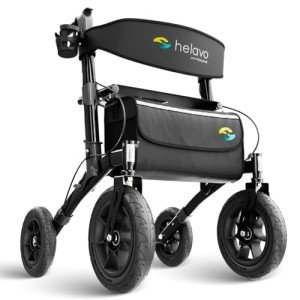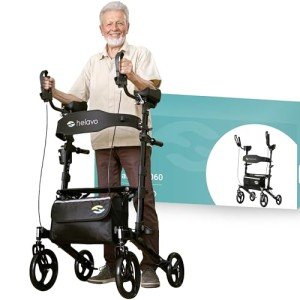The Importance of Elderly Walkers: Enhancing Mobility and IndependenceAs individuals age, their bodies undergo different changes that might impact their mobility. Conditions such as arthritis, osteoporosis, and other persistent disorders can make browsing the environment challenging for the Elderly Walker. Fortunately, assistive devices like walkers can substantially boost mobility, ensuring that seniors keep their self-reliance and lifestyle. This post will look into the various types of walkers available, their benefits, and essential factors to consider when choosing the best one.Understanding the Different Types of WalkersA walker can provide the necessary support for seniors dealing with mobility. However, not all walkers are created equivalent. Here’s a comprehensive breakdown of the different kinds of walkers available.Kind of WalkerDescriptionBest ForRequirement WalkerA Lightweight Walker frame with four legs offering fundamental support.People needing assistance while walking.Two-Wheeled WalkerA walker with 2 wheels at the front permitting for easier motion.Users who require more mobile support for faster walking.Four-Wheeled Lightweight 4-Wheel WalkerA rollator with four wheels, brakes, and a seat.Active seniors who require more mobility and a place to rest.Knee Outdoor WalkerA specialized walker with a padded platform for resting the knee.Individuals recovering from foot or ankle injuries.Folding WalkerA walker that can be collapsed for easy storage and transportation.Seniors needing convenience when traveling.Table 1: Types of WalkersAdvantages of Using a WalkerWalkers supply a wide range of advantages for seniors, consisting of:
- Enhanced Stability: Walkers offer extra support to the user, helping to promote self-confidence while walking.
- Improved Balance: With a walker, seniors can rearrange their weight, improving balance and lowering the risk of falls.
- Increased Independence: Users can walk around their homes and communities more easily, allowing them to take part in social activities.
- Minimized Pain: Walkers can reduce the effect on joints and muscles, making movement less agonizing for conditions like arthritis.
- Flexible Usage: Walkers appropriate for numerous environments, whether inside your home, outdoors, or on uneven surface areas.
Table 2: Benefits of Using a WalkerSelecting the Right WalkerChoosing the right walker is necessary to taking full advantage of mobility and making sure comfort. Here are some factors to consider:
- Weight Capacity: Ensure that the walker can support the user’s weight. Most walkers have a defined weight limit.
- Height Adjustment: Adjustable height features ensure that the walker is set to the suitable level for the user’s height, promoting excellent posture and comfort.
- Wheels vs. No Wheels: Depending on the user’s abilities and environment, a walker with wheels may be more useful for motion, while a non-wheeled walker might offer more stability.
- Extra Features: Some walkers include built-in seats, storage, or accessories (like cup holders) that can improve user experience.
Table 3: Considerations for Choosing a WalkerUpkeep of WalkersCorrect upkeep of walkers is essential for guaranteeing security and durability. Here are some standard upkeep ideas:
- Regular Inspections: Check for fractures, rust, or loose screws and make sure that the rubber ideas on the legs are intact.
- Wheel Maintenance: Ensure that wheels move freely and are not stuck; oil them if required.
- Modifications: Periodically check if the height and settings stay correct, changing them as essential to maintain user convenience.
Table 4: Maintenance Tips for WalkersFrequently Asked Questions About Elderly Walkers1. What is the average expense of an elderly walker?The costs of walkers can range substantially based upon the type and features. Standard walkers may cost in between ₤ 50-₤ 100, while specialty walkers or rollators can vary from ₤ 100 to ₤ 300.2. Are walkers covered by insurance?Numerous insurance plans, consisting of Medicare, cover the expense of walkers, offered they are considered clinically needed. It’s important to talk to your insurance supplier for specifics.3. How do I understand when my enjoyed one needs a walker?Indications may include difficulty walking individually, frequent falls or near-falls, and increased tiredness while carrying out day-to-day activities. A health care professional can offer a thorough assessment. 4. Can walkers be utilized outside?Yes, many walkers can be used both inside your home and outdoors. If preparing to use a walker outdoors, consider a design with wheels or broader legs for stability on numerous surfaces.5. The length of time can a walker last?With correct maintenance, an excellent quality walker can last for a number of years, though wear and tear will differ depending on usage frequency and conditions.Walkers are important tools that can bring back mobility and self-reliance for seniors while guaranteeing their safety. As people live longer and lead active lifestyles, investing in appropriate assistive devices like walkers is more crucial than ever. Understanding the types of walkers available, their benefits, and how to choose the right one can empower users and their caretakers to make informed options. Ultimately, the ideal walker can cause enhanced quality of life, permitting aging individuals to remain active participants in their communities.
4. Can walkers be utilized outside?Yes, many walkers can be used both inside your home and outdoors. If preparing to use a walker outdoors, consider a design with wheels or broader legs for stability on numerous surfaces.5. The length of time can a walker last?With correct maintenance, an excellent quality walker can last for a number of years, though wear and tear will differ depending on usage frequency and conditions.Walkers are important tools that can bring back mobility and self-reliance for seniors while guaranteeing their safety. As people live longer and lead active lifestyles, investing in appropriate assistive devices like walkers is more crucial than ever. Understanding the types of walkers available, their benefits, and how to choose the right one can empower users and their caretakers to make informed options. Ultimately, the ideal walker can cause enhanced quality of life, permitting aging individuals to remain active participants in their communities.